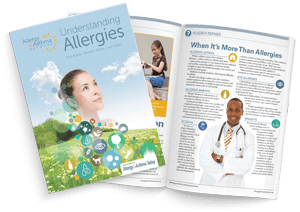Oral Allergy Syndrome (OAS)
- Home
- |
- Health A to Z –...
- |
- Oral Allergy Syndrome (OAS)
What is oral allergy syndrome?
Oral allergy syndrome (OAS) is also known as pollen-food allergy syndrome. OAS happens when people with pollen allergies to certain trees, grasses and weeds develop symptoms when they eat botanically related fruits and vegetables. Usually , OAS results in mild allergy symptoms, but symptoms may get worse during pollen season.
Examples of OAS include:
- irritated gums or swollen lips after eating a peach or tomato
- a runny nose or drippy eyes when exposed to ragweed pollen
- an itchy, tingly mouth, swollen lips and/or a sore throat after eating banana, melon or cucumber.
How common is oral allergy syndrome?
As many as 1 out of every 3 people with seasonal allergies may experience oral allergy syndrome – the exact number is unclear because the condition is often undiagnosed.
Oral allergy syndrome does not typically appear in young children. Symptoms may first arise in older children, teens and young adults who have been eating fruits or vegetables in question for years without any problem.
What pollens commonly trigger OAS symptoms?
Pollens that commonly trigger OAS symptoms are usually:
- birch trees
- grasses
- ragweed
What foods cause oral allergy syndrome?
The following lists show foods that are botanically related to birch, grasses and ragweed:
Birch pollen
- almond
- apple
- carrot
- celery
- cherry
- hazelnut
- kiwi
- peach
- pear
- plum
- potato
- pumpkin seed
Grass pollen
- kiwi
- melon
- peach
- tomato
Ragweed pollen
- banana
- chamomile
- cucumber
- echinacea
- melon (watermelon, cantaloupe, honeydew)
- sunflower seed
- zucchini

Oral Allergy Syndrome Chart Transcript
Oral Allergy Syndrome (OAS)
People with OAS develop symptoms around their mouth from eating the following raw fruits and vegetables when birch trees, grasses and ragweed are pollinating:
- Itchy or tingly mouth Hives on the mouth
- Scratchy or sore throat
- Swelling of the lips, mouth, tongue or throat
What foods cause oral allergy syndrome?
The following lists show foods that are botanically related to birch, grasses and ragweed:
Birch pollen
- almond
- apple
- carrot
- celery
- cherry
- hazelnut
- kiwi
- peach
- pear
- plum
- potato
- pumpkin seed
Grass pollen
- kiwi
- melon
- peach
- tomato
Ragweed pollen
- banana
- chamomile
- cucumber
- echinacea
- melon (watermelon, cantaloupe, honeydew)
- sunflower seed
- zucchini
What are the symptoms of oral allergy syndrome?
- Itchy or tingly mouth
- Hives on the mouth
- Scratchy or sore throat
- Swelling of the lips, mouth, tongue or throat
Onset of symptoms may seem random. Some people are only bothered during pollen season, but the rest of the year they can eat pollen-related foods with no problem. OAS symptoms usually occur to only fresh fruits and vegetables, not to the cooked form of these vegetables.
So, if you’re allergic to ragweed, a melon in February (when ragweed is dormant) may not bother you at all, while one in September (when ragweed pollen counts are high) could set off symptoms with the first bite.
Some people with OAS will react to fresh foods but not cooked or canned varieties. If you have grass allergy, for instance, you may be able to eat tomato sauce on pizza but develop itchy mouth from fresh tomato in a salad. Others may find they can eat certain varieties of a fruit (Macintosh apples versus Granny Smith, for instance) or fruits without their skins.

How is oral allergy syndrome treated?
While most oral allergy symptoms will go away when you stop eating the food, it’s a good idea to see an allergist for an individual consultation any time you experience allergy symptoms related to food. Food-related symptoms can sometimes alert you to a more dangerous allergy, such as latex.
The allergist will determine whether your symptoms are a mild cross reaction or whether they could lead to a life-threatening allergic reaction such as anaphylaxis.
Anaphylaxis from oral allergy syndrome is extremely rare, but if you’re at risk, you may require a prescription for epinephrine auto-injectors, the first-line treatment.
A board-certified allergist can give you an accurate diagnosis, advise you which foods to avoid and recommend treatments to relieve symptoms.
How is oral allergy syndrome prevented?
People with oral allergy syndrome can minimize or even avoid symptoms altogether by:
- Avoid the food that is causing symptoms.
- Bake or microwave the food in question before eating it. This can break down the allergic protein so that you are able to tolerate it. For example, you may be able to eat cooked tomato sauce on pizza but develop an itchy mouth from a fresh tomato in a salad.
- Peel the skin off fruits that cause symptoms or try other varieties of fruits (Macintosh versus Granny Smith apples, for instance).

